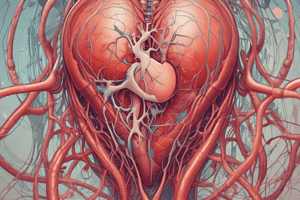Podcast
Questions and Answers
Which of the following is a key concept in cardiovascular physiology?
Which of the following is a key concept in cardiovascular physiology?
- Synaptic transmission
- Regulation of cardiac activity by neural control (correct)
- Understanding motor unit recruitment
- Investigating brain waves
What is the main focus of cardiovascular physiology?
What is the main focus of cardiovascular physiology?
- Investigating motor unit recruitment
- Understanding heart and blood vessel function (correct)
- Studying neurological signaling
- Exploring brain waves
Neurophysiology mainly studies the electrical activity of which systems?
Neurophysiology mainly studies the electrical activity of which systems?
- Nervous system (correct)
- Muscular system
- Respiratory system
- Circulatory system
Which of the following is NOT a component of neurophysiology?
Which of the following is NOT a component of neurophysiology?
What does neurophysiology investigate through electrocorticography (ECoG) or electroencephalogram (EEG)?
What does neurophysiology investigate through electrocorticography (ECoG) or electroencephalogram (EEG)?
Which branch of physiology investigates gas exchange between air and blood?
Which branch of physiology investigates gas exchange between air and blood?
What is the primary source of force generation and movement in animals like us?
What is the primary source of force generation and movement in animals like us?
Which part of the muscle physiology concerns the roles of myosin and actin filaments?
Which part of the muscle physiology concerns the roles of myosin and actin filaments?
What dynamic process describes internal conditions remaining constant despite external influences fluctuating?
What dynamic process describes internal conditions remaining constant despite external influences fluctuating?
In respiratory physiology, what process involves breathing in air containing oxygen and exhaling carbon dioxide?
In respiratory physiology, what process involves breathing in air containing oxygen and exhaling carbon dioxide?
Study Notes
Physiology: Understanding Life's Inner Workings
Physiology is the scientific study of how living organisms function. It explores the mechanisms underlying various life processes occurring within cells, tissues, organs, and systems. As we delve into specific aspects of this expansive field, let's examine each branch of physiology to better understand our everyday bodily functions and their intricate interconnectedness.
Cardiovascular Physiology
Cardiovascular physiology focuses on the heart and blood vessels, which work together to transport nutrients, oxygen, carbon dioxide, hormones, and other essential molecules throughout the body. Key concepts here include pumping action, electrocardiography, cardiac output, regulation of cardiac activity by neural control, and vasoconstriction versus vasodilation. We also learn about factors affecting blood pressure such as peripheral resistance and venous return.
Neurophysiology
Neurophysiology studies the electrical activity of nerves and muscles. This includes understanding neurological signaling through nerve impulses, synaptic transmission, neuronal communication, and central nervous system responses. Researchers investigate brain waves via electrocorticography (ECoG) or electroencephalogram (EEG), as well as motor unit recruitment during muscular contractions or evoked potentials following sensory stimuli.
Muscle Physiology
Muscle physiology concerns itself with skeletal, smooth, and cardiac muscle fibers—the sources of force generation and movement in animals like us. Through experiments, researchers discover principles governing muscle contraction, fatigue, metabolism, and regeneration after injury. For instance, they unravel the roles of myosin and actin filaments, calcium ion concentration changes, and troponin activation in crossbridge cycling.
Respiratory Physiology
Respiratory physiology investigates gas exchange between air and blood, as well as the mechanics of breathing. Topics covered include diffusion, pulmonary ventilation, lung surfactant, alveolar dead space volume, and chemoreceptors' role in regulating respiration. The process begins when we breathe in air containing oxygen (O₂) and exhale carbon dioxide (CO₂); however, it becomes more complex once we consider factors influencing arterial partial pressures, cellular pH levels, and autonomic control of respiration.
Homeostasis
Homeostasis describes the dynamic process whereby internal conditions remain constant even while external influences fluctuate. While all physiological systems contribute toward maintaining homeostasis, some critical instances involve temperature regulation, acid-base balance, fluid balance, endocrine system feedback loops, and neurological integration. Hence, these components demonstrate the complexity inherent in achieving equilibrium despite continuous inputs from the environment.
In summary, studying physiology helps elucidate the inner workings of our bodies. By examining these fundamental branches and observing interactions among them, we can develop deep insights into our daily activities and overall health. Moreover, understanding applied physiology lays the groundwork for advanced medical techniques to diagnose diseases, treat illnesses, and improve patient outcomes across diverse settings and clinical disciplines.
Studying That Suits You
Use AI to generate personalized quizzes and flashcards to suit your learning preferences.
Description
Explore the branches of physiology including Cardiovascular Physiology, Neurophysiology, Muscle Physiology, Respiratory Physiology, and Homeostasis. Dive into the mechanisms of how living organisms function at the cellular, tissue, organ, and system levels to better understand bodily functions and their interconnectedness.




